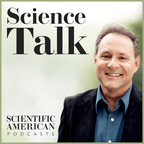
Science Talk
Summary: Science Talk is a weekly science audio show covering the latest in the world of science and technology. Join Steve Mirsky each week as he explores cutting-edge breakthroughs and controversial issues with leading scientists and journalists. He is also an articles editor and columnist at Scientific American magazine. His column, "Antigravity," is one of science writing's great humor venues. Also check our daily podcast from Scientific American : "60-Second Science." To view all of our archived podcasts please go to www.scientificamerican.com/podcast
- Visit Website
- RSS
- Artist: Scientific American
- Copyright: 2016 Scientific American, a division of Nature America, Inc. All Rights Reserved.
Podcasts:
Dan Ariely is professor of behavioral economics at Duke University. He talks about the subject of his most recent book, The (Honest) Truth About Dishonesty: How We Lie to Everyone--Especially Ourselves . Also see: Unveiling the Real Evil Genius
Portland State University anthropologist Cameron Smith talks with Scientific American 's John Matson about how multigenerational space exploration missions and colonization might change the human genome and thus shape human evolution
David Quammen talks about his latest book, Spillover: Animal Infections and the Next Human Pandemic . From his Web site : "The next big and murderous human pandemic, the one that kills us in millions, will be caused by a new disease--new to humans, anyway. The bug that's responsible will be strange, unfamiliar, but it won't come from outer space. Odds are that the killer pathogen--most likely a virus--will spill over into humans from a nonhuman animal"
Scientific American Editor in Chief Mariette DiChristina brings us up to date on the state of our New York City-based operation after Sandy. Recorded October 31 at 2:30 P.M Eastern time
A captive beluga whale has altered his normal songs to more closely approximate human pitch and rhythms. Christopher Intagliata reports.
The 2012 Nobel Prize in Chemistry was awarded jointly to Robert J. Lefkowitz and Brian Kobilka for studies of G-protein-coupled receptors, which are the portals by which information about the environment reaches the interior of cells and leads to their responses. About half of all drugs work by interacting with G-protein-coupled receptors
The 2012 Nobel Prize in Physics was awarded jointly to Serge Haroche and David J. Wineland for experimental methods that enable measuring and manipulation of individual quantum systems
The 2012 Nobel Prize in Physiology or Medicine was awarded jointly to John B. Gurdon and Shinya Yamanaka for the discovery that mature cells can be reprogrammed to become pluripotent
James McCarthy , Alexander Agassiz professor of biological oceanography at Harvard, talks about climate science and testifying before Congress, and the collaborations between climate scientists and the national security community as well as with evangelicals. And the Union of Concerned Scientists releases a report about the misleading coverage of climate science at Fox News and The Wall Street Journal
James Flynn studies intelligence at the University of Otago in New Zealand. And he features prominently in an article called “Can We Keep Getting Smarter?” in the September issue of Scientific American magazine. Back on July 10, Flynn visited the SA offices, where he chatted with a group of editors
Scientific American contributor David Appell talks with Mars Science Lab Project leader John Grotzinger, professor of geology at Caltech, about the plans for the rover on the Martian surface
Less than an hour after NASA received confirmation that the Curiosity rover was safely on the Martian surface , some principal members of the mission briefed the press. This is an edited presentation of that briefing, which started at about 11:20 P.M, Pacific time on August 5th.
Daniel Chamovitz , director of the Manna Center for Plant Biosciences at Tel Aviv University, talks about his new book What a Plant Knows .
Dimitar Sasselov, professor of astronomy at Harvard University and the founder and director of the Harvard Origins of Life Initiative, talks about his new book The Life of Super-Earths: How the Hunt for Alien Worlds and Artificial Cells Will Revolutionize Life on Our Planet
Mark Anderson, author of the book The Day The World Discovered the Sun , talks about the transit of Venus coming up on June 5th or 6th in different parts of the world and how it will be of use to astronomers searching for exoplanets